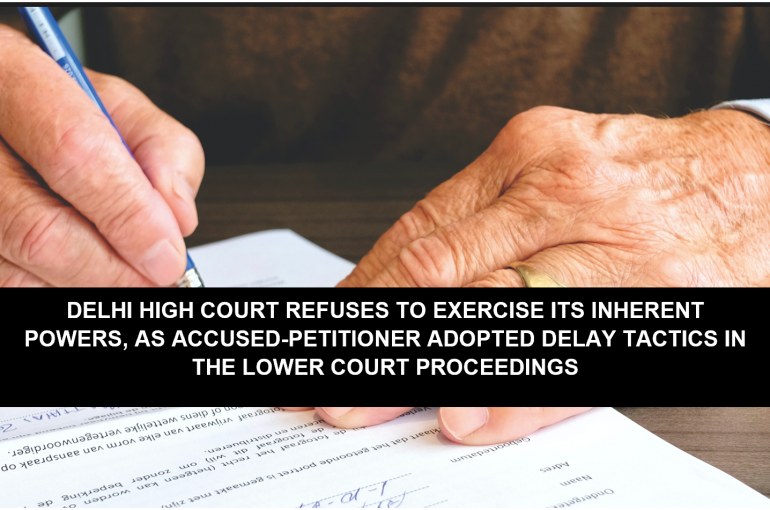DELHI HIGH COURT REFUSES TO EXERCISE ITS INHERENT POWERS, AS ACCUSED-PETITIONER ADOPTED DELAY TACTICS IN THE LOWER COURT PROCEEDINGS
Recently, Justice Anish Dayal of Hon’ble Delhi High Court passed a Judgment dated 19.12.2022 in the case titled Ajay Tyagi V. B9 Beverages, Criminal Miscellaneous Petition No. 6586 of 2022 and refused to allow the Petition under Section 482 of the Code of Criminal Procedure 1973 (CrPC), on the grounds that the Accused-Petitioner adopted delay tactics and contradictory stands in the Lower Court proceedings.
Metropolitan Magistrate Court:
In the present case, the Respondent, B9 Beverages filed a Suit before the Ld. Metropolitan Magistrate Court, Delhi (MM Court) under Section 143A of the Negotiable Instruments Act, 1881 (NI Act) (Power to direct interim compensation) and thereby sought interim compensation from the Petitioner, Mr. Ajay Tyagi, of Rs. 5 Lakhs i.e. 20% of the total value of the dishonoured Cheque of Rs. 25 Lakhs.
The Ld. MM Court, vide Order dated 21.08.2020, allowed the said Suit, thereby directing the Accused-Petitioner to pay the sum of Rs. 5 Lakhs to the Respondent within a period of 60 days.
Additional Sessions Judge Court
Aggrieved, the Accused-Petitioner filed a Revision Petition before the Ld. Additional Sessions Judge (ASJ) Court, Delhi seeking setting aside of the Order dated 21.08.2020, on the grounds inter alia that unless and until the Accused-Petitioner’s evidence was also complete, the Ld.MM Court could not have decided the Application under Section 143A NI Act and that the Ld. MM Court had failed to give any substantial reason while allowing the Suit.
On the other hand, the Respondent contended that the Accused-Petitioner used to adopt delay tactics and also failed to appear before the Ld. MM Court until non-bailable warrants were issued.
Thereafter, the Ld. ASJ Court dismissed the Revision Petition, vide Order dated 25.08.2022.
Aggrieved by the Order dated 25.08.2022, the Petitioner filed a Second Revision Petition before the Delhi High Court.
Issues
1) Whether the Ld. MM Court and the Ld. ASJ Court were correct in directing the Accused-Petitioner to pay the interim compensation?
2) Whether the delay tactics adopted by the Accused-Petitioner caused prejudice to the interests of the Respondent?
High Court Observations:
- That while considering the above issues the High Court observed that “Section 143A of NI Act was introduced as an ameliorative measure to remedy injustice caused to the payee of a dishonoured cheque resulting from delay tactics of unscrupulous drawers of the dishonoured cheques due to easy filing of appeals and obtaining stay on proceedings”.
- Further, the Court-in-charge of the complaint has to use its discretionary power judiciously while evaluating the application under Section 143A and take into account the facts and circumstances, including the accused’s stalling / delay tactics.
- That the High Court concluded that the Ld. MM’s Order was passed in light of the Accused-Petitioner’s conflicting stances and use of delaying / dilatory tactics and strategies.
- That the High Court further observed that “the Ld. ASJ has also noted that the summons were issued to the accused on 25th May 2019, due to non-appearance bailable warrants were issued on 17th July 2019 and 16th September 2019, and subsequently NBWs were issued for 14th October 2019, which were stayed on 27th November 2019. Again, due to non-appearance, NBWs were issued on 29th November 2019, but later on appearance of the accused, he was admitted to bail. It was further noted that the accused had not appeared on at least 6 more dates in 2020 and 2021, and therefore on 27.09.2021, the Ld. Court issued non bailable warrants again. The conduct of the accused is clearly egregious and has been consistently geared towards adopting dilatory tactics. And also, the statement of the petitioner that he had not filled in any further details in the cheque; or had given the cheque as a security; or that had already made a payment of Rs 6.82 Lakhs; or that he had to make more payments; or that finally he wanted to settle the matter, clearly shows prevarication by the accused”.
Conclusion
Thus, based on the aforesaid reasonings and upon examining the records of the case, the Delhi High Court passed a Judgment dated 19.12.2022 and refused to exercise its inherent powers under Section 482 CrPC, on the grounds that the Accused-Petitioner adopted significant dilatory tactics and irrational and contradictory stands relating to the Cheque in question. Therefore, the High Court dismissed the Petition filed by the Accused-Petitioner.
M.Sai Deekshitha
5th Year, ICFAI Law School
Intern, The Indian Lawyer





































Leave a Reply